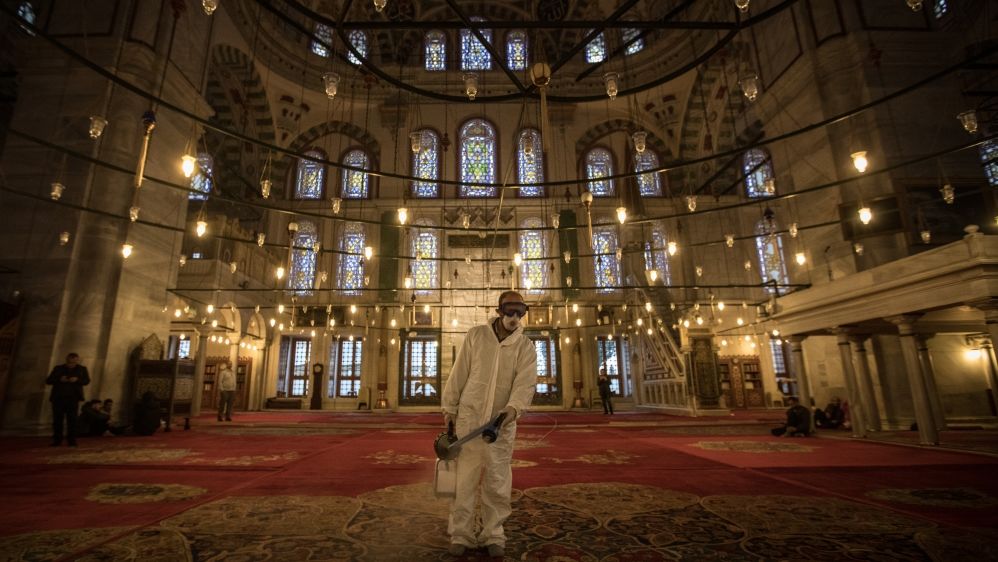
As mosques suspend congregational prayers due to the coronavirus, imams are looking at alternatives such as live-streaming prayers and sermons.
Al Jazeera takes a look at how some of the world’s largest mosques have adjusted in the wake of COVID-19:
Mecca’s Grand Mosque
Worshippers have not been allowed to enter Mecca’s Grand Mosque nor the Prophet’s Mosque in Medinah, the two main mosques for Muslims, since Saudi authorities suspended prayers on March 19 in an effort to combat the spread of the virus.
The ban followed a series of other measures in Mecca including: an initial ban on worshippers praying near the Kaaba, the cube-shaped structure in the centre of the Grand Mosque’s courtyard which Muslims across the world pray towards; and a ban on the Umrah pilgrimage, which seven million Muslims perform every year.
It remains unclear if the Hajj pilgrimage, which every able-bodied Muslim must perform once in their lifetime, will be held this year.
Jerusalem’s Al Aqsa Mosque
Muslim prayers at Jerusalem’s Al-Aqsa Mosque have been suspended since March 23 until further notice. The doors of the mosque and of the adjoining Dome of the Rock were shut a week before implementation of the full ban, allowing worshippers to only gather for prayers in the open areas of the compound.
It is the third most sacred site for Muslims and the site they believe Prophet Muhammad began his night journey to heaven.
Turkey’s Fatih Mosque
Turkey has cancelled all congregational worship at mosques, including Friday prayers, since March 16.
While Fatih Mosque, one of Istanbul’s largest and most historic mosques built after the Ottoman Sultan Mehmet the Conqueror, has kept its doors open, congregational prayers are banned.
UAE’s Sheikh Zayed Grand Mosque
Sheikh Zayed’s Grand Mosque has been closed for prayers and visits since March 15.
Located in Abu Dhabi, the capital city of the United Arab Emirates, the site is the country’s largest mosque and the principal place of worship for daily, Friday and Eid prayers. As well as being a site for worship, the mosque is also considered a top tourist attraction.
According to Amr Salah, an Abu Dhabi resident and frequent visitor of the mosque, the complex has been completely closed off.
Iraq’s Moussawi Grand Mosque
Iraq’s top Shia leader Ayatollah Ali al-Sistani has issued several edicts calling on citizens to social distance and avoid religious gatherings in order to curb the spread of the coronavirus.
Like other mosques across the country, the doors of Mousawi Grand Mosque in Iraq’s southern city of Basra have been shut to worshippers and visitors.
National Mosque of Malaysia
Malaysian authorities have imposed a movement control order since March 17. According to Siti Syuhada, a Kuala Lumpur resident, the directive has meant that all mosques are closed off to the public, with only the imam and staff members allowed to enter.
At Malaysia’s National Mosque, a tourist attraction and key religious hub in the capital, the mosque has continued to make the five daily calls to prayer.
East London Mosque
The UK’s largest mosque, the East London Mosque has banned the entry of all members of the public as a measure to curb the spread of the coronavirus.
Islamic Cultural Centre of New York
As of March 20, the Islamic Cultural Centre of New York, which is one of the largest mosques in the US city, banned all congregation including Friday prayers as well as weekly and weekend classes, according to its website.
Meanwhile, the building housing New York University’s Islamic Centre, which acts as a busy community and student hub for Muslims in New York City, has also been closed.



